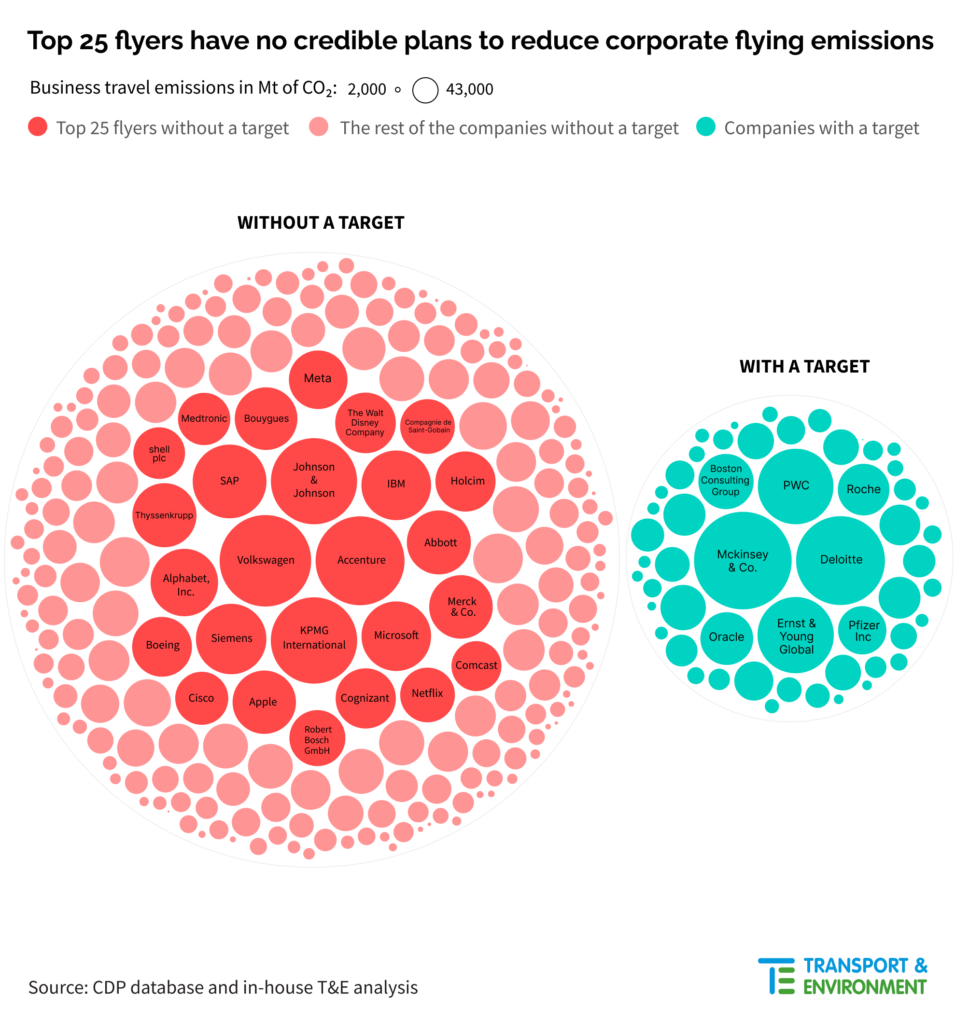Many Indian multinationals have no plans to reduce business travel
Of the nine Indian companies evaluated in the 2024 edition of the Travel Smart ranking, only two have set targets to reduce business travel emissions. LTIMindtree and Wipro are making leading efforts to cut the climate footprint associated with company travel and are rewarded with a B grade. But the seven others (HCLTech, Tech Mahindra, Infosys, HDFC Bank, State Bank of India, Tata Consultancy Services and Adani Green Energy) have made no progress since last year. This is a worrying sign that Indian companies aren’t acting fast enough or demonstrating genuine commitment to reduce air travel emissions.
The analysis shows a discrepancy between companies in the same industry – with ambitious companies setting targets and laggard companies refusing to do so year after year. For a third year Indian tech companies Tata Consultancy Services, Infosys and HCLTech all received a low C grade. But peers like LTIMindtree, Wipro or American tech giants Oracle or Adobe are much more ambitious, with targets to reduce what is often regarded as ‘the low hanging fruit’ of a company’s climate footprint. This demonstrates that businesses can make innovative changes and set ambitious targets by adopting new ways of working, replacing air travel with alternative modes of transport or through more virtual collaboration.
“We are facing one of the greatest challenges of our time: climate change. However, we see this as an opportunity to lead business transformation with purpose, innovate, and set ambitious goals for ourselves. By 2040, we aim to be net-zero, leveraging the latest in green tech, targeting 20% reduction in business travel emissions for FY 23-24, harnessing renewable energy, managing our water resources, and stepping up our recycling game. This is more than a goal; it’s our commitment to being at the forefront of sustainability and getting to the future, faster. Together”, explains Paneesh Rao, Chief Sustainability Officer, LTIMindtree.
Top flyers not making credible plans to reduce corporate flying
The analysis finds that among the 328 companies from the ranking, twenty-five multinationals responsible for 36% of business travel emissions have no plans to cut their polluting corporate flights[1]. If just these top 25 flyers cut their business flying in half, it would achieve a third of the emissions reductions needed by 2025 from the 328 companies in the ranking[2]. The 5.9 Mt of CO2 saved would be equivalent to the emissions produced by 3 million cars in a year.

By not setting targets, these top flyers risk quickly rebounding to pre-COVID levels of flying. A tracker of companies’ emissions published last year showed that companies that don’t set targets like Tata Consultancy Services, Infosys, Johnson & Johnson and Merck have already bounced back close to their 2019 levels of corporate travel, at only -24%, -21%, -28% and -17% respectively in 2022. This is in stark contrast with Wipro, which has set a target and kept its 2022 emissions -53% below 2019 levels.
Other top flyers in the ranking with no credible plans to cut down travel emissions include Siemens, Microsoft and Google. These global companies consider themselves progressive and pioneering businesses yet fail to tackle air travel emissions. To highlight the worst offenders, the Travel Smart campaign has launched fake airlines, such as Siemens Airlines, IBM Business Airlines and Johnson & Johnson Airlines, drawing attention to their higher share of responsibility when it comes to reducing corporate flights. For instance, Siemens’ business travel emissions in 2019 of 0.31 Mt of CO2 were equivalent to the carbon footprint of close to two daily flights for a whole year from London to New York.


“Top flyers have an outsized responsibility to cut down their flying. Years after the corporate world learnt to connect and collaborate with fewer flights, many companies are yet to lift a finger to act on the climate footprint of their business flying. We can no longer afford empty promises by business leaders. More action and binding commitments to maintain lower levels of business flying are needed,” Denise Auclair concludes.
One way to achieve reduced flying amongst corporate entities in India is to get involved with cBalance’s flagship FairTravel programme. The organisation is working with pioneering IT and Business Process Outsourcing/finance companies in India such as LTIMindtree and Wipro to help them reduce their air travel emissions and rethink their travel choices, providing carbon footprinting, training and communications support for Corporate Sustainability teams among other things.
Note to editors:
The Travel Smart Ranking ranks 328 US, European and Indian companies according to 11 indicators, relating to air travel emissions, reduction targets and reporting. Companies are given an A, B, C or D grade. In this year’s edition of the ranking, 16 companies qualified for an A grade, 40 a B, whilst the overwhelming majority received a C (230) and 427 companies saw a D grade next to their name. 44 companies report the full climate impact of their travel (this includes non-CO2 emissions) – up from 40 last year. This is the third edition of the ranking.
This ranking covers corporate flying, which is key to reducing emissions and to the future of sustainable aviation. Broader aspects of a company’s business model should also be addressed for it to be considered a leader in sustainability.
[1] The 25 companies mentioned are the top flyers in 2019 from the selection of 330 companies in the Travel Smart Ranking (full list here). They are responsible for 36% of emissions from the companies in the ranking.
[2] The Travel Smart campaign asks companies to set targets of at least 50% reduction, by 2025 or sooner. The goal has been established based upon the rigorous analysis in Transport & Environment’s Roadmap to climate neutral aviation showing that a 50% reduction in overall business travel is needed during this decade, in order to keep aviation within a 1.5°C-compatible pathway.